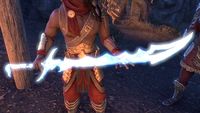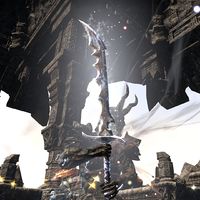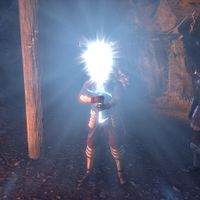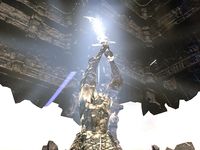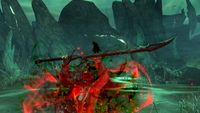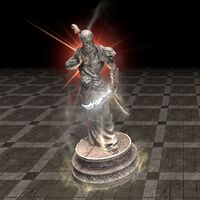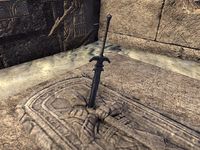Lore:Shehai
A Shehai or Spirit Sword is an ability used by the Ansei to manifest a sword from their very soul.[1] By sheer force of will, an Ansei warrior could create this ethereal sword of pure thought and it would take shape in their hand,[2] This form of the Way became known as "Shehai Shen She Ru" or Way of the Spirit Sword,[3] an art known as sword magic.[4] and all sword-singers trained to learn this form through intense training and meditation in the Way of the Sword, but not every swordsman was successful in becoming an Ansei.[1][5] Those who could were said to be more than mortal.[6][7] According to Master Assistant Materials Acquirer Pacrooti, the Ansei had mastered their sword techniques so thoroughly that they could access abilities similar to a mage's spells.[8] Conversely, there have been certain gifted individuals who could form a Shehai from a very young age or with little or no training.[5] Other times, a Shehai may be formed in times of great stress.[3][5]
To become an Ansei, a sword-singer had to demonstrate an ability to form the Shehai.[5] These Shehai were typically described as pale, misty, insubstantial, and as if it was made of light. Sometimes its shape wouldn't even be particularly sword-like, and would be of no use as an actual weapon.[1][9][5]
Ansei of the second-rank and above were known to have the ability to not only form the Shehai, but wield it as a weapon in battle.[5] Their Shehai shined brighter and was much deadlier. Described as an "unstoppable weapon of great might" that could cut down foes like "a scythe through wheat", disarming such an Ansei could only be done by severing their head or taking their mind.[7][1][5] There was some evidence, however, that suggested the Shehai of an Ansei could be shattered, leaving behind only its essence.[10] Ansei of the highest virtue wandered the countryside engaging in battle, righting wrongs, and seeking to end the strife.[1] To them, manifesting the Shehai was said to have come as naturally as breathing.[11]
Forbidden techniques involving the Shehai are reputedly capable of great devastation to a continent, such as that used by the rebel band of Ansei called the Hiradirge.[12] Indeed, the Celestial Warrior corroborated this legend when he claimed the Shehai of a first-rank Ansei is what sank Yokuda.[13] Further, some accounts claim that this forbidden sword-stroke was called the "Pankratosword"—a maneuver that could destroy the very laws of nature.[UOL 1]
Decline[edit]
—Derik Hallin
After conquering Hammerfell, the Yokudans found themselves in a time of relative peace. Many warriors put down their swords in order to build their new nation.[14][15] Ansei warriors became very rare, and although many training halls were established throughout Hammerfell, very few produced masters of the Shehai.[5]
When Hammerfell came under attack from a race of giant Goblins from a rent in space time,[9] Hallin scoured the land to find the five mighty swords (a mix of Shehai and smithing) that ended a similar goblin threat during the time of Divad Hunding. Although their use was forbidden, Hallin and his companions wielded the blades and hurled the swords together into the void, defeated the goblin army by sealing them in the void between their world and Mundus. As a result, their Shehai was forever destroyed. Hallin saved the people and eventually restored the teachings of Frandar Hunding to Hammerfell.[9][16][17] Later in his life, when threatend by a surviving giant goblin warlord, the Queen of Ojwambu pleaded with Derik Hallin, the "Last of the Ansei". According to legend, Hallin called forth the spirits of long-dead Ansei to aid him in his defense of the city. Numerous Ansei warriors appeared and fought alongside Hallin until they were victorious.[14]
By the mid-Second Era, there were no known Ansei warriors, with native Redguard swordsmen believing the existence of Shehai to be absurd[18] and some foreign scholars dismissed the Shehai as "superstitious nonsense".[7] For unexplained reasons, the Ansei simply died out.[19] By the Third and Fourth Eras, although there were some who followed the old ways within the ancient Halls of Virtues of War, very few Redguards had ever seen a Shehai, let alone called forth one.[9]
Modern Occurrences[edit]
In the mid-First Era, the Yokudan sword-saint Rada al-Saran became a Vampire Lord and, at some point, lost his ability to manifest his Shehai. He journeyed to the Reach, where he met with the legendary Red Eagle, a Reachman hero named Faolan who was known for wielding a flaming sword called Red Eagle's Fury.[20][21] Faolan taught Rada how to reclaim his Shehai by focusing on what he loved most: his Gray Host, an army of vampires and werewolves to whom Rada wished to grant salvation.[20] Rada would later claim that his Shehai had been "reforged in bitter blood," and it thereafter took the form of a black sword that glowed a bloody red.[22]
When the Warrior constellation temporarily took a mortal form in the mid-Second Era, he wielded an extremely powerful Shehai that was capable of producing shockwaves and magical storms.[23][24]
Circa 2E 582, the Redguard swordmaster Sai Sahan achieved his lifelong ambition of summoning his Spirit Sword. He did this by following the ancient teachings of Red Eagle while on an expedition to the Reach, following in the footsteps of Rada al-Saran by putting aside his devotion to duty, and focusing on what he loved: his companion, Lyris Titanborn.[20] With Rada's death that same year, Sai mourned for his devotion to restoring the monstrous Gray Host rather than following the honorable tradition of the Ansei.[25]
Gallery[edit]
References[edit]
- ^ a b c d e Redguards, History and Heroes — Destri Melarg
- ^ Elenaire's Journal
- ^ a b Divad the Singer — Destri Melarg
- ^ Castles and Coffers Volume III: Hel Ra Citadel
- ^ a b c d e f g h From The Memory Stone of Makela Leki — Makela Leki
- ^ Chronicles of the Five Companions 6 — Sai Sahan
- ^ a b c The Improved Emperor's Guide to Tamriel: Hammerfell — Flaccus Terentius, 2E 581
- ^ Pacrooti's hireling correspondence 60 in ESO
- ^ a b c d Notes For Redguard History — Destri Melarg
- ^ Box of Shehai Essence contraband item in ESO
- ^ The Duchess of Anguish
- ^ Pocket Guide to the Empire, 3rd Edition: Other Lands — Imperial Geographical Society, 3E 432
- ^ The Warrior's dialogue during Assaulting the Citadel in ESO
- ^ a b The True-Told Tale of Hallin
- ^ Nandanath Thrice-Noble's dialogue in ESO
- ^ Shrine to Derik Hallin
- ^ Derik Hallin's dialogue in ESO
- ^ Correspondence with Abnab al-Babnab
- ^ Letter found within the School of Rahni'Za
- ^ a b c Red Eagle's Song quest in ESO
- ^ Red Eagle's Fury in Skyrim
- ^ Rada al-Saran during the Kingdom of Ash quest in ESO
- ^ Assaulting the Citadel quest in ESO
- ^ The Warrior's named attacks
- ^ Sai Sahan's dialogue during the Second Chances quest in ESO
Note: The following references are considered to be unofficial sources. They are included to round off this article and may not be authoritative or conclusive.
- ^ Lord Vivec's Sword-Meeting With Cyrus the Restless, The Imperial Library

